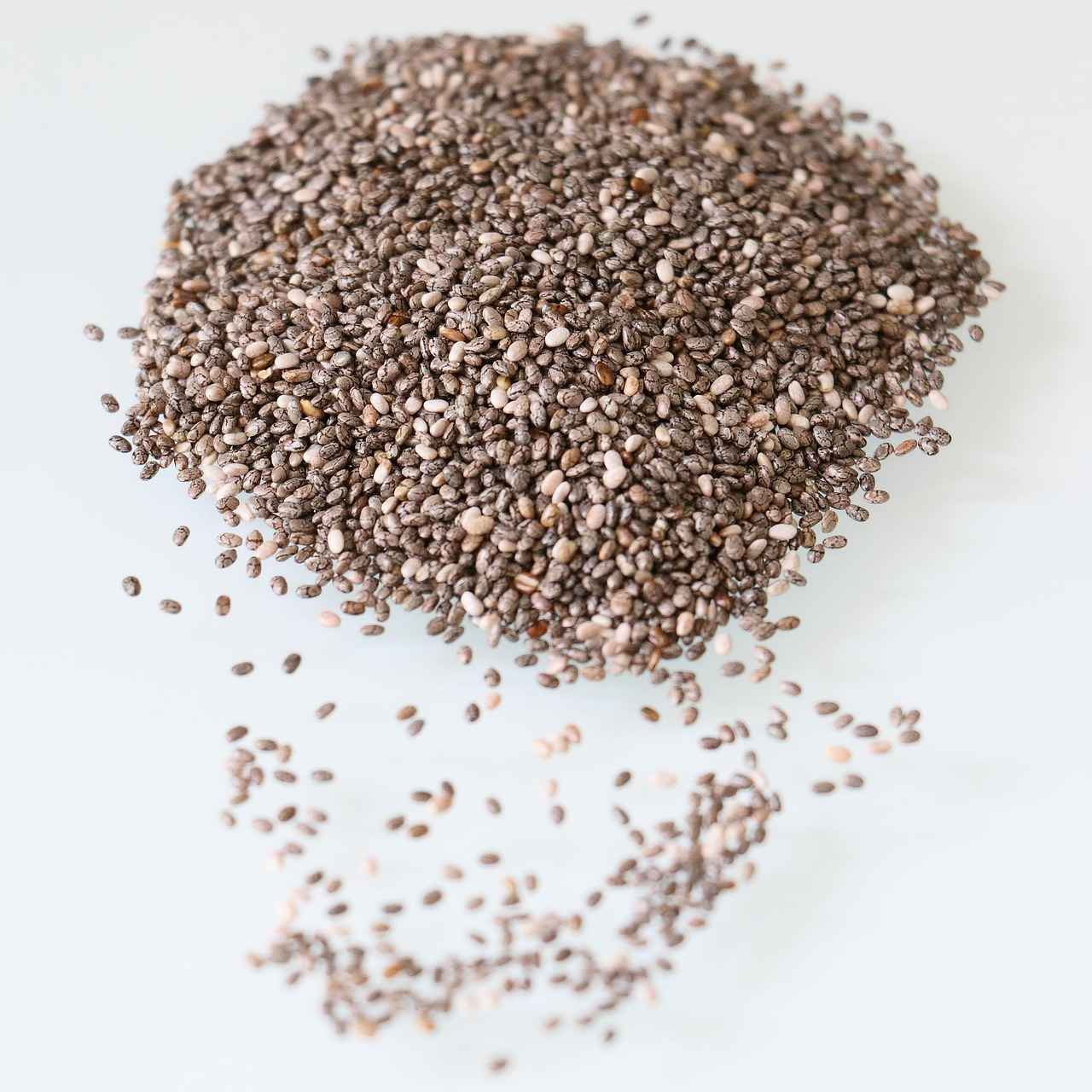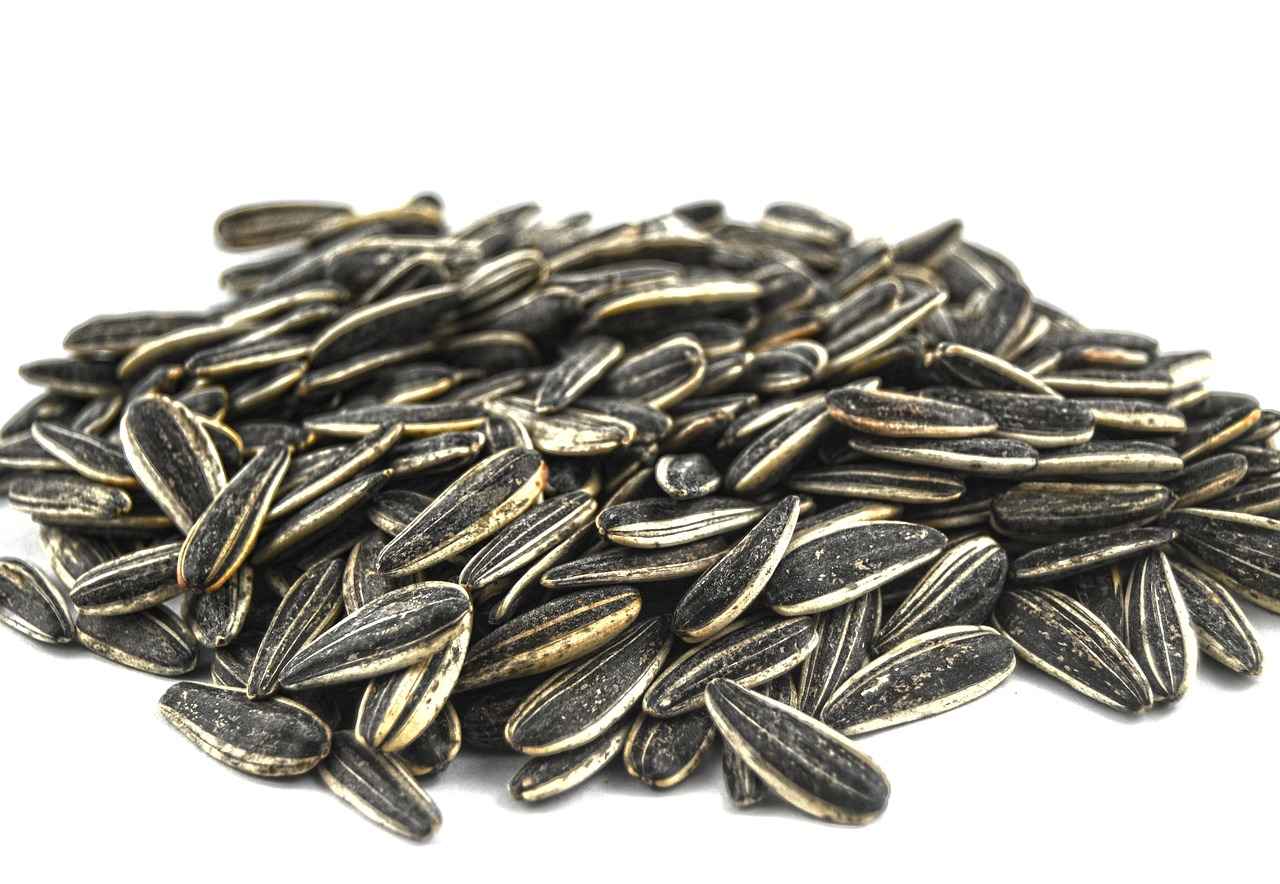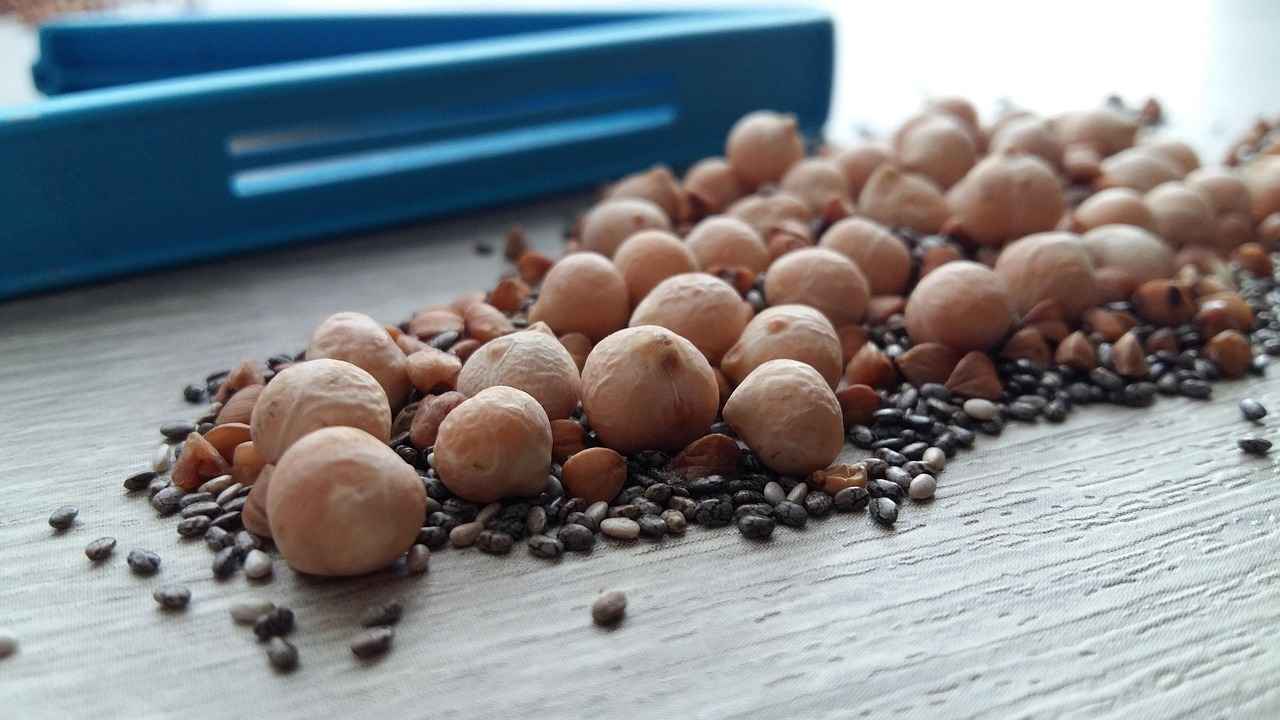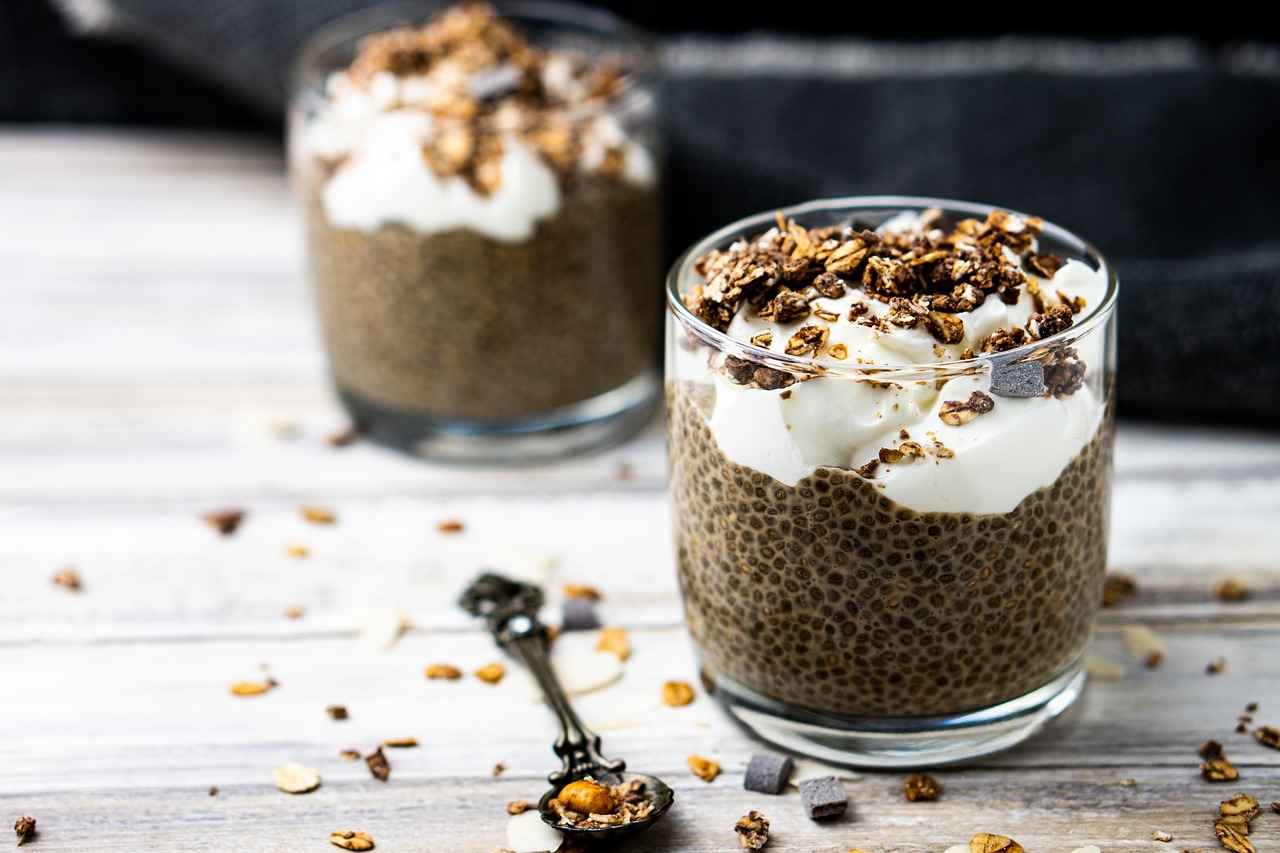This article explores the potential side effects of chia seeds, offering insights into their benefits and risks to help you make informed dietary choices.
Chia seeds, derived from the Salvia hispanica plant, are small black or white seeds known for their impressive nutritional profile. They are particularly high in omega-3 fatty acids, dietary fiber, and essential minerals such as calcium and magnesium. These tiny seeds have gained popularity as a superfood, often touted for their health benefits.
While chia seeds are generally safe for most individuals, some may experience allergic reactions. Symptoms can range from mild to severe and may include:
- Skin rashes
- Itching
- Gastrointestinal discomfort
It is crucial to monitor your body’s response when introducing chia seeds into your diet.
Due to their high fiber content, chia seeds can sometimes lead to digestive problems such as:
- Bloating
- Gas
- Constipation
These issues are more likely to occur when chia seeds are consumed in large quantities without adequate hydration. It is essential to drink plenty of water when incorporating these seeds into your meals.
Chia seeds are an excellent source of dietary fiber, containing approximately 11 grams per ounce. This high fiber content can support digestive health, but it is important to consume them in moderation and ensure sufficient fluid intake to avoid discomfort.
The typical serving size of chia seeds is about 1 to 2 tablespoons. Exceeding this amount can increase the risk of digestive issues without providing additional health benefits.
Chia seeds may interact with certain medications, particularly those that affect blood sugar levels or are classified as blood thinners. If you are taking medication, it is crucial to consult with a healthcare provider before adding chia seeds to your diet.
Medications such as warfarin or other anticoagulants may have enhanced effects when combined with chia seeds due to their omega-3 fatty acid content, which can influence blood clotting.
Chia seeds can help stabilize blood sugar levels, making them beneficial for individuals managing diabetes. However, those on diabetes medications should monitor their blood sugar closely, as chia seeds may contribute to hypoglycemia if not properly managed.
Despite being nutrient-dense, chia seeds are also calorie-rich. Overconsumption without balancing overall caloric intake may lead to weight gain. It is essential to incorporate chia seeds into a balanced diet to reap their benefits without excess calories.
For most people, long-term health risks associated with chia seeds are minimal. However, excessive consumption may lead to nutrient imbalances or digestive issues, so moderation is key.
To enjoy the benefits of chia seeds while minimizing side effects, start with small amounts and gradually increase your intake. Always ensure adequate hydration to promote digestive health and overall well-being. Chia seeds can be added to smoothies, yogurt, or baked goods for an easy nutritional boost.

What Are Chia Seeds?
Chia seeds are tiny black seeds derived from the Salvia hispanica plant, a member of the mint family. These seeds have gained immense popularity in recent years due to their remarkable nutritional profile and health benefits. Native to Central America, chia seeds were once a staple food for ancient Aztec and Maya civilizations, who valued them for their energy-boosting properties.
Rich in omega-3 fatty acids, chia seeds are an excellent source of plant-based nutrition. They contain approximately 5 grams of omega-3s per ounce, making them one of the best plant sources of this essential fatty acid. Omega-3s are known for their anti-inflammatory properties and are beneficial for heart health.
In addition to omega-3s, chia seeds are packed with dietary fiber. An ounce of chia seeds provides about 11 grams of fiber, which is crucial for maintaining a healthy digestive system. This high fiber content can help regulate bowel movements, promote satiety, and support weight management.
Moreover, chia seeds are a rich source of various essential nutrients, including calcium, magnesium, and phosphorus. These minerals play vital roles in bone health, muscle function, and overall metabolic processes. The presence of antioxidants in chia seeds also contributes to their health benefits by combating oxidative stress in the body.
Chia seeds are incredibly versatile and can be easily incorporated into various dishes. They can be added to smoothies, yogurt, oatmeal, or baked goods, enhancing both the nutritional value and texture of meals. When mixed with liquid, chia seeds absorb water and form a gel-like consistency, making them perfect for puddings and as a thickening agent in recipes.
However, it is essential to consume chia seeds in moderation. While they are nutrient-dense, their high fiber content can lead to digestive discomfort if consumed in excess, especially without adequate hydration. Starting with 1 to 2 tablespoons per day is recommended, gradually increasing the amount as your body adjusts.
Overall, chia seeds are a powerhouse of nutrition that can contribute significantly to a balanced diet. Their unique combination of omega-3 fatty acids, fiber, and essential nutrients makes them a valuable addition to any health-conscious individual’s pantry. As with any food, it is important to listen to your body and adjust your intake accordingly to maximize the benefits while minimizing any potential side effects.

Are There Any Allergic Reactions to Chia Seeds?
Chia seeds have gained immense popularity due to their numerous health benefits, including being a rich source of omega-3 fatty acids, fiber, and various essential nutrients. However, as with any food, it’s crucial to be aware of potential side effects, particularly allergic reactions. Understanding the signs and symptoms of an allergy to chia seeds can help you make informed dietary choices and ensure your well-being.
While chia seeds are generally considered safe for most individuals, some people may experience allergic reactions. These reactions can manifest in various ways, making it essential to recognize the symptoms early on. Common signs of an allergic reaction to chia seeds include:
- Skin Rashes: This may appear as hives or eczema-like patches on the skin.
- Itching: Persistent itching can occur, affecting various areas of the body.
- Gastrointestinal Discomfort: Symptoms such as nausea, vomiting, or diarrhea may arise.
It is important to note that these symptoms can vary from person to person. In some cases, individuals may experience more severe reactions, such as anaphylaxis, which requires immediate medical attention. If you suspect that you are having an allergic reaction to chia seeds, it is crucial to cease consumption immediately and consult a healthcare provider.
Individuals with a history of allergies, particularly to other seeds or nuts, may be at a higher risk of developing an allergy to chia seeds. Additionally, people with conditions such as asthma or eczema may also be more susceptible. If you have any known allergies, it is advisable to approach chia seeds with caution and monitor your body’s response closely.
If you are trying chia seeds for the first time, consider the following steps to identify any potential allergic reactions:
- Start with a Small Amount: Begin with a teaspoon of chia seeds to see how your body reacts.
- Monitor for Symptoms: Keep an eye out for any signs of allergic reactions, such as those listed above.
- Consult a Healthcare Professional: If you experience any adverse symptoms, seek medical advice for proper evaluation.
In the event of an allergic reaction, it is essential to take the appropriate steps:
- Discontinue Use: Stop consuming chia seeds immediately.
- Seek Medical Attention: If symptoms are severe, especially difficulty breathing or swelling of the face, seek emergency help.
- Keep a Record: Document your symptoms and any other foods consumed to help your healthcare provider assess the situation.
To prevent future allergic reactions, consider discussing your dietary choices with a nutritionist or allergist. They can provide tailored advice and recommend alternatives that align with your nutritional needs.
In conclusion, while chia seeds offer numerous health benefits, it is vital to be aware of the possibility of allergic reactions. By understanding the symptoms and taking precautions, you can enjoy chia seeds safely and responsibly.

Can Chia Seeds Cause Digestive Issues?
Chia seeds have gained immense popularity in recent years due to their numerous health benefits. However, as with any food, it is essential to understand the potential side effects, particularly concerning digestive health. This article delves into the question:
Chia seeds are derived from the Salvia hispanica plant and are celebrated for their rich nutritional profile, including high levels of omega-3 fatty acids, protein, and fiber. In fact, a single ounce of chia seeds contains approximately 11 grams of dietary fiber. While fiber is crucial for digestive health, excessive intake, especially from concentrated sources like chia seeds, can lead to complications.
The fiber in chia seeds is predominantly soluble, which means it can absorb water and expand in the digestive tract. When consumed in large quantities without sufficient hydration, this can result in bloating, gas, and even constipation. It is particularly important for individuals who are not accustomed to high-fiber diets to introduce chia seeds gradually.
- Hydration is Key: Always drink plenty of water when consuming chia seeds to help them expand properly and move through the digestive system.
- Start Small: Begin with a small serving size, such as 1 teaspoon, and gradually increase it to allow your digestive system to adjust.
- Mix with Other Foods: Incorporating chia seeds into smoothies, yogurt, or oatmeal can help mitigate potential digestive issues.
It is crucial to be aware of the signs that indicate your body may be reacting negatively to chia seeds:
- Bloating: A feeling of fullness or swelling in the abdomen.
- Gas: Increased flatulence or discomfort due to gas buildup.
- Constipation: Difficulty in passing stools or infrequent bowel movements.
Individuals with pre-existing digestive disorders, such as irritable bowel syndrome (IBS) or inflammatory bowel disease (IBD), should approach chia seeds with caution. Consulting a healthcare provider before adding them to your diet is advisable, particularly if you have a history of digestive issues.
While chia seeds can be a valuable addition to a balanced diet, it is essential to consume them mindfully. Their high fiber content can lead to digestive discomfort if not managed appropriately. By ensuring proper hydration and starting with small amounts, you can enjoy the benefits of chia seeds without the adverse effects. Always listen to your body and adjust your intake as necessary.
How Much Fiber Do Chia Seeds Contain?
Chia seeds, derived from the Salvia hispanica plant, have gained popularity in recent years due to their impressive nutritional profile. Among their many benefits, one of the most notable is their high dietary fiber content. In this section, we will explore the fiber content of chia seeds, its benefits, and how to consume them safely.
Chia seeds are an excellent source of dietary fiber, containing approximately 11 grams of fiber per ounce. This makes them one of the richest sources of fiber available from plant-based foods. The fiber in chia seeds is primarily soluble, which means it absorbs water and forms a gel-like substance in the digestive tract. This property not only aids in digestion but also promotes a feeling of fullness, making chia seeds a popular choice for those looking to manage their weight.
- Improved Digestion: The soluble fiber in chia seeds can help regulate bowel movements, preventing constipation and promoting overall digestive health.
- Blood Sugar Control: High fiber intake can slow down the absorption of sugar, helping to stabilize blood sugar levels, which is particularly beneficial for individuals with diabetes.
- Heart Health: A diet rich in fiber is associated with a lower risk of heart disease, as it can help reduce cholesterol levels and improve overall cardiovascular health.
While the high fiber content in chia seeds can offer numerous health benefits, it is crucial to consume them with adequate water. When chia seeds are consumed without sufficient hydration, they can absorb water in the digestive system, leading to potential digestive discomfort such as bloating, gas, or even constipation. To avoid these issues, it is recommended to:
- Soak chia seeds in water or liquid before consumption.- Gradually increase your intake to allow your body to adjust.- Drink plenty of fluids throughout the day.
The typical serving size of chia seeds is about 1 to 2 tablespoons (approximately 15 to 30 grams). Consuming more than this recommended amount can increase the risk of digestive issues and may not provide additional health benefits. It’s essential to listen to your body and adjust your intake based on how you feel.
While fiber is essential for good health, excessive consumption can lead to adverse effects. Some individuals may experience gastrointestinal discomfort, particularly if they are not used to a high-fiber diet. It’s important to introduce chia seeds gradually into your diet and monitor your body’s response.
Incorporating chia seeds into your meals can be both easy and delicious. Here are some practical ways to enjoy them:
- Add them to smoothies for a nutrient boost.
- Mix them into yogurt or oatmeal for added texture.
- Use them in baking recipes like muffins or bread.
- Make chia pudding by soaking them in milk or a dairy-free alternative overnight.
By understanding the fiber content of chia seeds and how to consume them safely, you can enjoy their numerous health benefits while minimizing the risk of digestive discomfort. Always remember to stay hydrated and listen to your body as you incorporate these tiny yet powerful seeds into your diet.
What Is the Recommended Serving Size?
When it comes to incorporating chia seeds into your diet, understanding the appropriate serving size is crucial for maximizing their health benefits while minimizing potential side effects. Chia seeds, known for their rich nutrient profile, can be a fantastic addition to your meals, but moderation is key.
A typical serving size of chia seeds is about 1 to 2 tablespoons. This quantity is generally sufficient to reap the nutritional benefits without overwhelming your digestive system. Consuming more than this recommended amount can lead to various digestive issues, including bloating, gas, and constipation, particularly if you do not drink enough water.
Chia seeds are incredibly high in fiber, with about 11 grams per ounce. While fiber is essential for digestive health, too much fiber without adequate hydration can cause discomfort. Therefore, if you are new to chia seeds, it is advisable to start with a smaller quantity and gradually increase your intake to allow your body to adjust.
Moderation in serving size is vital not only for digestive comfort but also to avoid unnecessary calorie intake. Chia seeds are calorie-dense; consuming excessive amounts can lead to unintended weight gain if not balanced with your overall dietary intake. A careful approach ensures that you enjoy the benefits of chia seeds while maintaining a healthy lifestyle.
Incorporating chia seeds into your meals can be simple and enjoyable. Here are some practical tips:
- Start Small: Begin with 1 teaspoon and gradually increase to 1 tablespoon as your body adjusts.
- Hydrate: Always consume chia seeds with plenty of water. Soaking them in liquid before consumption can help prevent digestive issues.
- Add to Smoothies: Blend chia seeds into smoothies for a nutritional boost without altering the texture significantly.
- Top Your Meals: Sprinkle chia seeds on yogurt, salads, or oatmeal for added crunch and nutrition.
Exceeding the recommended serving size of chia seeds can lead to several digestive complications. Symptoms may include:
- Bloating
- Gas
- Constipation
These symptoms arise primarily due to the high fiber content. Additionally, consuming large amounts may not provide any extra health benefits, as your body can only utilize a certain amount of nutrients at a time.
If you have any underlying health conditions or are taking medications, it is crucial to consult with a healthcare professional before adding chia seeds to your diet. They can provide personalized recommendations based on your health status and dietary needs.
In summary, while chia seeds are a powerhouse of nutrients, sticking to the recommended serving size of 1 to 2 tablespoons is essential for enjoying their benefits without adverse effects. By incorporating them thoughtfully into your meals and ensuring adequate hydration, you can enhance your diet healthily and deliciously.

Do Chia Seeds Interact with Medications?
Chia seeds have gained significant popularity as a superfood, thanks to their rich nutrient profile and health benefits. However, it is essential to understand that they may also interact with certain medications, which could have implications for your health. This article will delve into the potential interactions between chia seeds and medications, particularly focusing on blood thinners and diabetes medications.
Chia seeds are derived from the Salvia hispanica plant and are known for their high content of omega-3 fatty acids, fiber, protein, and various vitamins and minerals. These tiny seeds can absorb water, forming a gel-like substance, which contributes to their ability to promote satiety and support digestive health.
One of the most critical interactions to consider is between chia seeds and blood thinners. Chia seeds are rich in omega-3 fatty acids, which have natural anticoagulant properties. This means they can enhance the effects of medications like warfarin and other anticoagulants, potentially leading to an increased risk of bleeding.
- Warfarin: Patients taking warfarin should consult their healthcare provider before adding chia seeds to their diet.
- Aspirin: Similar caution is advised for those on aspirin therapy.
Chia seeds can also influence blood sugar levels, making them a double-edged sword for individuals with diabetes. While they can help stabilize blood sugar levels due to their high fiber content, they may also lead to hypoglycemia in those taking diabetes medications, especially if not monitored closely.
- Insulin: If you are on insulin therapy, it’s crucial to track your blood sugar levels closely when consuming chia seeds.
- Metformin: Those on metformin should also be cautious, as the combination may lead to lower than desired blood sugar levels.
Given the potential for interactions, it is crucial to consult with a healthcare provider before incorporating chia seeds into your diet, especially if you are on medications that affect blood clotting or blood sugar levels. A healthcare professional can provide personalized advice based on your medical history and current medications.
If you receive the green light from your healthcare provider, consider the following tips for safely incorporating chia seeds into your diet:
- Start Small: Begin with a small amount, such as one teaspoon, and gradually increase to avoid digestive discomfort.
- Stay Hydrated: Ensure adequate hydration, as chia seeds absorb water and can lead to digestive issues if consumed dry.
- Monitor Your Body: Pay attention to how your body responds after consuming chia seeds, particularly if you are on medication.
Chia seeds can be a nutritious addition to your diet, but it’s important to be aware of their potential interactions with certain medications. By consulting with a healthcare provider and monitoring your intake, you can enjoy the benefits of chia seeds while minimizing any risks associated with their consumption.
What Medications Should Be Cautioned Against?
Chia seeds have gained popularity for their numerous health benefits, but it is essential to understand their potential interactions with certain medications. One area of concern is their interaction with anticoagulants and blood-thinning medications.
Chia seeds, derived from the Salvia hispanica plant, are small, nutrient-dense seeds that are rich in omega-3 fatty acids, fiber, protein, and various vitamins and minerals. Their high omega-3 content is particularly noteworthy, as it can influence various bodily functions, including blood clotting.
Medications such as warfarin and other anticoagulants work by reducing the blood’s ability to clot. When combined with chia seeds, the enhanced effects of these medications may lead to an increased risk of bleeding. This is primarily due to the omega-3 fatty acids present in chia seeds, which can further thin the blood.
Individuals consuming both chia seeds and anticoagulants should monitor for signs of excessive bleeding, which can include:
- Unusual bruising
- Prolonged bleeding from cuts
- Blood in urine or stool
- Frequent nosebleeds
If any of these symptoms occur, it is crucial to consult a healthcare provider immediately.
In addition to anticoagulants, chia seeds may also interact with medications that affect blood sugar levels. For individuals taking diabetes medications, incorporating chia seeds into the diet may lead to hypoglycemia, especially if not monitored closely. The seeds can help stabilize blood sugar levels, but caution is advised when adjusting dietary habits.
If you are taking any medications, especially anticoagulants or blood sugar regulators, consult with your healthcare provider before adding chia seeds to your diet. They can provide personalized advice based on your health status and medication regimen.
For those who are cleared to consume chia seeds, it is advisable to start with small amounts, such as 1 teaspoon per day, and gradually increase the intake. Ensure that you are drinking plenty of water, as chia seeds absorb liquid and can expand in the stomach. This practice helps in preventing digestive discomfort and allows for better absorption of nutrients.
While chia seeds offer numerous health benefits, it is vital to be aware of their potential interactions with certain medications. By understanding how chia seeds affect blood clotting and blood sugar levels, individuals can make informed dietary choices. Always consult with a healthcare professional to ensure safe and effective incorporation of chia seeds into your diet.
How Do Chia Seeds Affect Blood Sugar Levels?
Chia seeds have gained popularity in recent years due to their impressive nutritional profile and health benefits. One area of interest is their effect on blood sugar levels. Understanding how chia seeds influence blood sugar can be particularly important for individuals managing diabetes or those on certain medications.
Chia seeds are rich in fiber, particularly soluble fiber, which can slow the absorption of sugar in the bloodstream. This gradual absorption helps prevent spikes in blood sugar levels after meals, making chia seeds a beneficial addition to a balanced diet. Furthermore, their high omega-3 fatty acid content may also contribute to improved insulin sensitivity, which is crucial for maintaining stable blood sugar levels.
While chia seeds can offer significant benefits for blood sugar regulation, individuals who are diabetic and taking medications that lower blood sugar should exercise caution. The fiber in chia seeds can enhance the effects of these medications, potentially leading to hypoglycemia, a condition characterized by dangerously low blood sugar levels. Regular monitoring and consultation with a healthcare provider are essential for those in this situation.
The typical serving size of chia seeds is about 1 to 2 tablespoons. Consuming chia seeds within this range can provide the desired health benefits without overwhelming the body. It is advisable for individuals on diabetes medications to start with smaller amounts and gradually increase their intake while monitoring their blood sugar levels closely.
Chia seeds can absorb up to 12 times their weight in water. Therefore, adequate hydration is crucial when consuming them. Insufficient water intake can lead to digestive issues and may also impact how effectively chia seeds help stabilize blood sugar levels. When incorporating chia seeds into your diet, consider soaking them in water or adding them to smoothies and other liquids to ensure proper hydration.
If you are on diabetes medications, it is vital to discuss any dietary changes, including the addition of chia seeds, with your healthcare provider. They can provide personalized advice based on your health status and medication regimen, helping you to navigate the potential benefits and risks associated with chia seeds.
In summary, chia seeds can be a valuable tool in managing blood sugar levels due to their high fiber content and other nutritional benefits. However, individuals on diabetes medications must approach their consumption with caution to avoid the risk of hypoglycemia. By understanding the effects of chia seeds and consulting with healthcare professionals, you can safely incorporate them into your diet and enjoy their numerous health benefits.

Can Chia Seeds Lead to Weight Gain?
Chia seeds have gained popularity in recent years due to their impressive nutritional profile. However, despite their numerous health benefits, it’s crucial to understand their potential implications for weight management. This article delves into the question:
Chia seeds are tiny, nutrient-dense seeds derived from the Salvia hispanica plant. They are packed with omega-3 fatty acids, fiber, protein, and various essential minerals. While these seeds can be a valuable addition to a balanced diet, their high caloric content can pose challenges if consumed excessively.
One ounce (about 28 grams) of chia seeds contains approximately 140 calories. This calorie density means that while they provide a wealth of nutrients, they can also contribute significantly to your daily caloric intake. Overeating chia seeds without adjusting other dietary components may lead to an excess in calories, which can result in weight gain.
To prevent potential weight gain, it is essential to practice portion control when consuming chia seeds. The recommended serving size is typically between 1 to 2 tablespoons per day. Exceeding this amount can lead to an increase in caloric intake without additional nutritional benefits. Keeping track of your overall caloric consumption is crucial to maintaining a healthy weight.
- Hydration: Chia seeds absorb water and expand in size. To avoid digestive discomfort and to manage caloric intake effectively, ensure you consume them with plenty of fluids.
- Meal Planning: Incorporate chia seeds into meals that are low in calories, such as smoothies, salads, or yogurt, to enhance their nutritional value without significantly increasing caloric intake.
- Monitor Overall Diet: Be mindful of what other foods you are consuming alongside chia seeds. A balanced diet rich in fruits, vegetables, lean proteins, and whole grains can help mitigate the risk of weight gain.
Chia seeds are high in fiber, which can promote feelings of fullness and aid in digestion. This can be beneficial for weight management, as a higher fiber intake is often associated with lower body weight. However, if consumed in large quantities, the fiber content can lead to digestive issues such as bloating or constipation, which may counteract their benefits.
While chia seeds are indeed a nutrient-rich food that can offer numerous health benefits, they also come with a risk of weight gain if not consumed in moderation. Being aware of their caloric density and practicing portion control is essential for those looking to incorporate chia seeds into their diet without compromising their weight management goals. By balancing chia seed consumption with a well-rounded diet and adequate hydration, individuals can enjoy the health benefits of these seeds while minimizing the risk of unwanted weight gain.

Are There Any Long-term Health Risks?
Chia seeds have gained popularity as a superfood, celebrated for their impressive nutritional profile. However, while they offer numerous health benefits, it’s essential to consider the long-term health risks associated with their consumption. For most individuals, these risks are minimal, but understanding the potential issues can help you make informed dietary choices.
One of the primary concerns regarding chia seeds is the possibility of excessive consumption. While they are rich in omega-3 fatty acids, fiber, and essential nutrients, eating them in large quantities can lead to nutrient imbalances. For instance, chia seeds are high in fiber, which is beneficial for digestive health. However, consuming too much fiber without adequate hydration can result in gastrointestinal discomfort, including bloating, gas, and constipation.
To mitigate these risks, moderation is key. A recommended serving size is typically around 1 to 2 tablespoons per day. Exceeding this amount may not only lead to digestive issues but can also result in an excessive caloric intake, potentially contributing to weight gain. It’s crucial to balance chia seed consumption with other dietary components to maintain overall health.
Another consideration is the omega-3 fatty acids present in chia seeds. While beneficial in moderation, excessive intake can interfere with blood clotting, particularly for individuals on anticoagulant medications. Chia seeds can enhance the effects of blood thinners like warfarin, leading to an increased risk of bleeding. Therefore, it is advisable for individuals on such medications to consult with a healthcare provider before incorporating chia seeds into their diet.
Additionally, some people may experience allergic reactions to chia seeds. Symptoms can range from mild skin rashes to more severe gastrointestinal issues. If you notice any adverse reactions after consuming chia seeds, it is advisable to discontinue use and consult a healthcare professional.
Furthermore, the high fiber content of chia seeds can lead to nutrient malabsorption if not consumed with adequate fluids. It’s important to drink plenty of water when incorporating these seeds into your diet to prevent potential digestive complications.
In terms of long-term health implications, research has shown that chia seeds can play a role in stabilizing blood sugar levels. However, for individuals with diabetes who are on medication, chia seeds could potentially lead to hypoglycemia if not monitored closely. Therefore, individuals managing blood sugar levels should be cautious and consult their healthcare provider when adding chia seeds to their diet.
In summary, while chia seeds are a nutritious addition to most diets, it is essential to consume them in moderation to avoid potential long-term health risks. By being mindful of serving sizes, hydration, and individual health conditions, you can enjoy the benefits of chia seeds while minimizing any adverse effects. Always consult with a healthcare professional if you have specific health concerns or dietary restrictions.

How to Incorporate Chia Seeds Safely into Your Diet?
Chia seeds have gained immense popularity in recent years due to their numerous health benefits. However, incorporating them into your diet requires a careful approach to avoid potential side effects. This article will provide you with essential tips on how to enjoy chia seeds safely while maximizing their nutritional advantages.
When introducing chia seeds into your diet, begin with a small quantity, such as one teaspoon or half a tablespoon. This allows your body to adjust to the increased fiber intake without overwhelming your digestive system. Gradually increase the amount as you become more accustomed to the seeds.
After you have successfully incorporated a small amount of chia seeds, consider increasing your intake slowly. Aim for a maximum of 1 to 2 tablespoons per day. This gradual increase helps minimize the risk of digestive upset, such as bloating or gas, which can occur when consuming high-fiber foods too quickly.
One of the most crucial aspects of consuming chia seeds is ensuring you are adequately hydrated. Chia seeds can absorb up to 12 times their weight in water, which can lead to digestive issues if not enough fluid is consumed. To avoid discomfort, drink plenty of water throughout the day, especially when eating chia seeds.
Incorporating chia seeds into your meals can enhance their health benefits. Consider adding them to smoothies, yogurt, or oatmeal. This not only improves the taste but also helps with digestion. Chia pudding, made by soaking the seeds in milk or a milk alternative, is another delicious way to enjoy them while ensuring proper hydration.
As you introduce chia seeds into your diet, pay close attention to how your body reacts. If you experience any adverse effects, such as gastrointestinal discomfort or allergic reactions, consider reducing your intake or consulting a healthcare professional. Everyone’s body is different, and it’s essential to find what works best for you.
If you have existing health conditions or are taking medications, it is wise to consult a healthcare provider before adding chia seeds to your diet. They can provide personalized advice based on your health history and current medications, ensuring that you avoid potential interactions or side effects.
To maintain the freshness and nutritional value of chia seeds, store them in a cool, dry place, preferably in an airtight container. This prevents them from becoming rancid and ensures you get the most out of their health benefits.
While chia seeds are nutrient-dense, they are also calorie-rich. Be mindful of your overall caloric intake to avoid unintended weight gain. Balancing chia seeds with other foods in your diet can help you reap their benefits without exceeding your daily caloric needs.
Incorporating chia seeds into your diet can be a rewarding experience when done safely. By starting with small amounts, increasing gradually, staying hydrated, and monitoring your body’s response, you can enjoy the many health benefits that chia seeds offer while minimizing any potential side effects.
Frequently Asked Questions
- What are the main side effects of chia seeds?
Chia seeds can cause digestive issues like bloating, gas, and constipation, especially if consumed in large amounts without enough water. Some people might also experience allergic reactions, including skin rashes or gastrointestinal discomfort.
- How can I prevent digestive issues when consuming chia seeds?
To avoid digestive discomfort, it’s essential to start with a small serving size of chia seeds, typically 1 to 2 tablespoons, and gradually increase your intake. Also, drink plenty of water to help your body process the high fiber content.
- Can chia seeds interact with medications?
Yes, chia seeds may interact with certain medications, particularly blood thinners like warfarin and diabetes medications. It’s always best to consult your healthcare provider before adding chia seeds to your diet if you’re on medication.
- Are chia seeds safe for everyone?
While chia seeds are safe for most people, those with specific allergies or digestive issues should approach them with caution. Moderation is key, and it’s wise to monitor your body’s response when introducing them into your diet.
- How can I incorporate chia seeds into my meals?
You can easily add chia seeds to smoothies, yogurt, oatmeal, or baked goods. Just remember to soak them in water or another liquid beforehand to help with digestion and maximize their benefits!












